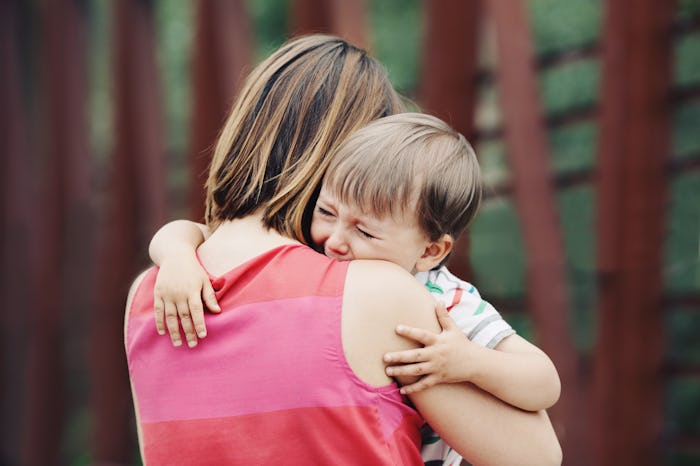Life

What Your Day Care Provider Wants You To Know About Those Crying Drop-Offs
When my son was just over 2 years old, I was in school. Fortunately, the school I attended had a great day care program — but my kid still screamed bloody murder at each drop-off. It may be common, but that doesn't make it any easier to deal with. Fortunately, your kids' caregivers have seen it all, and what your day care provider wants you to know about those crying drop-offs can make you feel a lot better about the situation.
For precisely one day in my early 20s, I worked as a day care provider at a large day care in New York City. Those 10 hours was all it took for me to realize that it was the worst idea in the world for me to be a day care worker. You have to have the patience of a saint, the constitution of a surgeon, and the wardrobe of a utility worker. I had cute shoes, hated snot, and realized quickly that I found other people's children really annoying.
Almost all of the kids cried at drop-off. Granted, they did shove me in with the 2 year olds like Ramsay Bolton shoves people in a dungeon with man-eating canines, and it was just as overwhelming. I just assumed it was normal, but is it?
I spoke to Gina Feldser, a former day care worker and now elementary school teacher in New York City about those crying drop-offs and what she, along with your own day care provider, wants you to know. (Honestly, her answer may surprise you.)
"Lots of kids go through that sort of separation anxiety," she tells Romper. "It happens the most to kids who are about 2 or 3, especially if they've never been in a day care before. It's scary and they're not sure if you're coming back, even if you tell them that you are." My kid? He totally thought I was full of crap. "I'll be back in a few hours" translated in his brain as "I will perish here alone without ever seeing you again."
She also says that for some kids, it just keeps happening — like, all through their toddler years. Feldser adds that kids can, and do, calm down very quickly after their parent leaves, but that initial shock is hard for them. "It helps if you smile and leave quickly. The longer you hang around consoling your inconsolable child, the longer it takes for him or her to calm down."
Once your child is home, she suggests talking to them about their day at school, reinforcing all the fun they had, and preparing them for the next day. "They really do understand what you tell them, and reminding them of all the fun they have, and how much they like the other kids and teachers helps a lot."
Feldser did provide a note of warning, though. "Follow your gut. If you think it's more than mere separation anxiety, do a few check-ins — unannounced. Talk to the other parents at drop-off. You'll know if things seem off. Otherwise, make a game plan for drop-off and stick to it. With some kids you almost have to drop the kids off and then tuck-and-roll out of the day care to lessen the effects of separation anxiety. But as long as you take an active role in their experience, things should go a lot more smoothly for everyone."